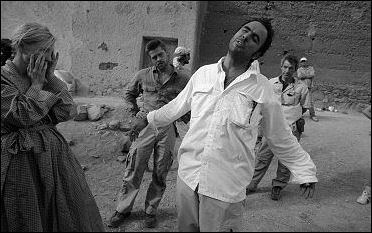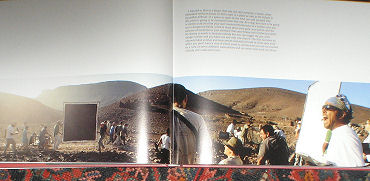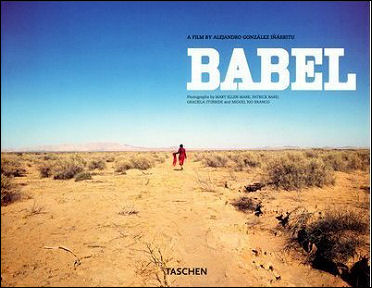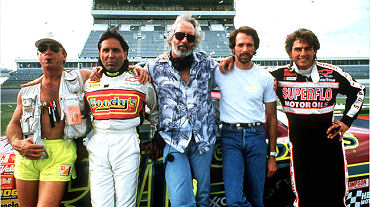“Things have been so moribund for so long in the [James] Bond business that it was always going to take some major defibrillation to jerk it back to life,” comments New Yorker critic Anthony Lane in the latest issue. “Die Another Day, the last film, was a gruelling nadir, although the producers would be right to point out that it earned $450 million dollars. This means that the sight of Pierce Brosnan driving an invisible car, though bound to dismay every Bond-revering adult, was catnip to the larger constituency of teenage boys, who were comfortable with a film that felt like a video game.
“What they will make of Casino Royale — no babes, no toyland, and the poker not even online — is anyone√ɬ¢√¢‚Äö¬¨√¢‚Äû¬¢s guess, but the earnings of the new film will doubtless affect the look, and the casting, of the next. If Craig falters, then I guess it√ɬ¢√¢‚Äö¬¨√¢‚Äû¬¢s full speed ahead to Chris Rock as 007 and Borat as Blofeld. That would be a shame, because Casino Royale, though half an hour too long, is the first semi-serious stab at Ian Fleming, and at the treacherous terrain that he marked out, since On Her Majesty√ɬ¢√¢‚Äö¬¨√¢‚Äû¬¢s Secret Service, in 1969.”
Hollywood Elsewhere, which has officially been put on Columbia’s arms-length shitlist (i..e, graciously invited to see Columbia product but only at all-media screenings, which usually happen a week or less from opening day), will finally see Casino Royale tomorrow night. Until then…
Golden Globe predictions
Having spoken to a “rather large” percentage of 90-some Hollywood Foreign Press members, The Envelope‘s Tom O’Neil is reporting that at this somewhat early stage of the game that Golden Globe voters “are absolutely crazy about Babel, The Queen and The Departed.
“The other two slots for best drama picture will probably go to two of these three — Flags of Our Fathers, Bobby or World Trade Center. They’re not responding gushingly to The Pursuit of Happyness” — I observed yesterday that Gabriele Muccino‘s film seems to be sliding– “but they love Will Smith‘s performance and plan to nominate him.
“One voter said that, between the two sparring 9/11 movies, they prefer World Trade Center to United 93 “because it’s more about the human relationships involved.” Brilliant deduction!!
“On the comedy/musical side, Dreamgirls, Little Miss Sunshine, Borat and The Devil Wears Prada look like locks for best pic bids. The fifth slot could go to Thank You for Smoking or another small indie. Some observers say Stranger Than Fiction, but not everyone agrees.”
Borat lawsuiter busted
The Smoking Gun has posted eight (8) MySpace shots of lardbucket Justin Seay, one of the fine young gentlemen trying to sue the Borat producers over claims he and his pals were coerced by the film’s producers into signing a release while they were bombed. And as Defamer‘s Mark Lisanti has already observed, the shots are persuasive evidence that Seay’s claim that he was pressured or led or goaded into a state of debilitating intoxication is bullshit.
Bring Back the Vega Brothers
John Travolta and Michael Madsen as the twin brothers of Vic and Vincent Vega descending upon Los Angeles to avenge the deaths of Vic (drilled by Tim Roth‘s Mr. Orange in Reservoir Dogs) and Vincent (grease-gunned by Bruce Willis in Pulp Fiction) in a new Vega Brothers movie? That”s the dumbiest sequel set-up I’ve ever heard in my life. Tarantino must be losing his mind.
V=Buy = yoj know what? Fuck what happened in Dogs and Fiction…really. To hell with story logic. Just bring the brothers back and put them into some heavy-shit situations and just do it. Did anybody give a damn when Travolta and Samuel L., Jackson didn’t fall down bleeding when that dope-dealer kid ran out of the bathroom and started blasting? Of course not. Was it logical? No, and it doesn’t matter.
Alejandro Taschen
I’ve made no secret about being a fool for Taschen books, and damned if I haven’t gotten into another one — a making-of-Babel coffee-table book composed of 250 or more shots taken during the location shooting in Morocco, Mexico and Japan. Good viewing, good revisiting, good immersion. Better if you’ve seen the movie, but stirring either way.

Babel director Alejandro Gonzalez Innaritu explains a gesture he wants from costar Cate Blanchett (l.) as Brad Pitt (playing her husband) listens
The 302-page book was edited by by Maria Eladia Hagerman, who’s had the honor, intrigue and adventure of being married to Babel director Alejandro Gonzalez Innaritu for the last 14 years. An idea came to Hagerman, an avid photographer and book editor (she worked on a volume of poetry by Mexican poet Jaime Sabines), as her husband was doing Babel location-scouting and regaling her with the details.
“I saw an opportunity to create a portrait of the worlds that inspired Babel,” she says. “Not so much the stars as much as the people who are not always on the screen…the people who are part of these worlds.”
That’s an accurate description — this is only marginally a book about Brad Pitt, Cate Blanchett, Gael Garcia Bernal and Rinko Kikuchi shooting a movie. It’s much more of a cultural atmosphere trip, which is naturally fitting given the film’s focus on absorbing the rituals and aromas of native cultures.
Hagerman chose four photographers to shoot in the three separate locations — Mary Ellen Mark and Patrick Bard covered the Morocco shoot, Graciela Iturbide captured the Mexico filming, and Miguel Rio Branco photographed the third and final location filming in Tokyo. (Additional Moroccan-shoot photographs came from unit photographer Murray Close.)

Babel crew shooting opening shot in Moroccan desert, as Innaritu (r.) calls for quiet (or whatever…I wasn’t there) during spring 2005 shoot
One of my favorite shots is of Innaritu describing how to play a scene to Brad Pitt and Cate Blanchett during the Moroccan portion. I asked him about this last week, and he said he wanted Blanchett, whose character is limp and bleeding from having been shot near the base of her neck, to look like a Pieta figure with her head back and arms spread out.
And I was shaking my head over a wide-angle shot of Innaritu and his crew getting the film’s very first image — a middle-aged, weather-beaten man (i.e., the seller of the high-powered hunting rifle) walking along rugged desert terrain. The shot has a quiet, meditative alone-ness…and yet the Taschen book photography shows some 23 or 24 people were involved, including two large sun reflectors and a long section of parallel metal track. It hasn’t made the opening shot seem inorganic exactly, but I don’t think it will ever quite feel the same.
The Babel book went on sale last Thursday in Mexico and did rather well, says Hagerman. It goes on sale in the States this week. Hagerman and her husband are going to attend a two-hour book signing at the Beverly Hills Taschen store (354 No. Beverly Drive — tel: 310.274.4300) on Thursday, at 7pm.

Seling “Apocalypto”
Mel Gibson‘s Apocalypto (Touchstone, 12.8) needs to make it with a much broader demographic than just Latinos and Native Americans to get any kind of decent traction, much less lift off the runway. A near-ecstatic thumbs-up comment from Edward James Olmos in a Robert Welkos L.A. Times article is insufficient persuasion. Olmos is responding to an ethnic heritage issue (Apocalypto is about ancient Mayans) as well as cinematic chops, and therefore can’t be trusted.

Gibson, Icon chief Bruce Davey, Rogers & Cowan publicist Alan Neirob and Disney publicist Dennis Rice need to get WASP and Jewish journos to speak up for this film on its own cinematic merits. The Latino sell is an astute way to get things going, but only that. It’s just a launch mechanism.
Has there ever been any proof that Latino audiences support serious art films? I don’t have the comprehensive data right before me, but I have an impression that they’ll always leave you at the altar if you’re selling any kind of quality-level movie about Latino culture. Did U.S.-residing Latinos respond to Maria Full of Grace or Girlfight or Y Tu Mama Tambien in any kind of sizable way? Will they support Babel or Pan’s Labyrinth or Children of Men — three extremely well-made films by a trio of Mexican directors working at the summit of their powers — to any great degree? You tell me.
Gibson and his homies are in denial at this stage, but they need pasty-faced white guys to step up and run with the ball and spread the word among non-Hispanic moviegoers. If they don’t, Apocalypto is dead.
Here’s NPR’s Kim Masters on the Latino sell and the hurdles Gibson and his top quarterbacks are facing.
Olmos said to Welkos that Apocalypto is “arguably the best movie I’ve seen in years. I was blown away…[the story is] just breathtaking.” I’m paying attention to this only because an Ain’t It Cool guy said the same thing after the Austin screen- ing a few weeks back. Besides, Olmos used the word “arguably,” which always means a lack of certainty.
Good Shepherd blues
I first wrote about Robert De Niro‘s The Good Shepherd (Universal, 12.22) last August, at which time a three-hour version had been research-screened and, I was told, deemed too long. That was three months ago, and now comes word that the Eric Roth-scripted CIA drama isn’t going to screen for press or awards groups until 12.4. Nothing wrong with that — there’s a certain distinction in being the last major film to be shown.
But if you were running things and wanted to get the maximum bang out of a film like this, which obviously betokens quality-level viewing of one kind or another, would you have said to De Niro and his producer Jane Rosenthal last August to please have Shepherd done and screenable by 12.4? Of course not. You’d want to start screening it sometime in early to mid November (at the latest), like all the other distributors are doing with year-end films. This tells you De Niro has been having trouble getting it right. And that in itself is a warning flag.
The upside is that it’s said to be a killer cinematic assemblage (knockout visuals, great editing…maybe that’s what all the down-to-the-wire futzing has been about?) and that it’s definitely going to be a multi-layered, adult-level thing — more nutritious elements than 90% or even 95% of the other films out there, so let’s just hold our water and wait.
Shepherd is a story of a real-life CIA counter-espionage ace (Matt Damon), largely modelled on James Jesus Angleton, who gradually succumbs to obsessiveness and paranoia as he is swallowed more and more by his work. It’s said to be dense and labrynthian and exacting, but the main narrative is about Damon gradually “paying a price” for being ultra-obsessive about counter-sleuthing.
I wrote a few days ago that it seems to be a cautionary tale about workaholicism. I related to that because I’m that guy — consumed by work to the exclusion of almost everything presumed to constitute “a life.” No cat, no dog, no kids, no wife, no meatballs in the kitchen, no hedges to trim…nothing but the warm-bath vortex of the job.
Borat street fight
This Sun story by Emily Smith says Borat star Sacha Baron Cohen was repeatedly slugged on the streets of Manhattan a week or so ago. It allegedly happened after he approached a guy and said, “I like your clothings. Are nice! Please may I buying? I want have sex with it.” (That’s a pretty exact quote — was Smith tape-recording the encounter?) The story says the guy “took one look at Cohen and punched him in the face, ” after which Cohen “yelled for help but was slugged again and again.”
Hold up…he yelled for help like Jerry Lewis would have if someone had attached him in an early ’50s Martin and Lewis comedy? If Smith’s reporting is accurate (and I’m not saying it necessarily is — she writes for the Sun, after all), she’s basically telling us that when push comes to shove, Cohen squeals like a little pig. I strongly doubt the accuracy of Smith’s story. Instinct usually takes over in encounters of this sort and you generally shove and hit back. But if it’s true (she writes that Cohen “was rescued by actor pal Hugh Laurie who had been on his way to a New York bar” with the Borat star), my respect for the man has just plummeted.
Holson does Bruckheimer
First Ross Johnson‘s Deja Vu, blow-up-the ferry-so-it-looks-like-9/11 piece, and now a fawning, all-too-obliging Jerry Bruckheimer profile by N.Y. Times reporter Laura Holson.

The stink of smugness on the set of Top Car (i.e., Days of Thunder).
An honest look at Bruckheimer would acknowledge the obvious, which is that his action films of the mid to late ’90s had a signature element — super-sexy visuals, sharply-crafted scripts, macho wit, an underlying smarty-pants jocularity — and today that element is gone. If and when some enterprising masochist writes a detailed, definitive Bruckheimer career analysis, the gutting of this mid-to-late Clinton-era Bruckheimer sensibility (which basically came from the residue of Don Simpson’s creative input, which lingered two, three, four years after his death) will definitely be noted. Holson doesn’t even nod in its direction.
The Pirates movies, of course, have been astoundingly successful , and they’ve probably enabled Bruckheimer to help pay for his Gulfstream jet and his Kentucky horse farm, but if they’re about nothing but the empty application of craft — they vacuum the soul and lay waste the spirit. The dollars they’ve earned aren’t clean, like tobacco or cocaine-industry profits; the hosannahs they’ve gotten from people who should know better (like a certain columnist who said they dispense “joy”) are reprehensible.
To what extent, one wonders, is the making of the Pirate trio connected to Bruckheimer’s admitted “fear of failure”? Director Tony Scott (Deja Vu) tells Holson that “Bruckheimer’s exacting standards” — i.e., standards in service of absolutely nothing but financial profit — “come from a deep-seated need to remain relevant. ‘There is a confidence that comes with age, but Jerry is still insecure, as I’m insecure,’ Scott says. ‘The insecurity comes from the fact you think you might lose it. Not the 10 houses or 4 Jaguars. It’s that your confidence might have gone.'”
Golden Flower preem

At Sunday night’s premiere of Zhang Yimou’s Curse of the Golden Flower (Sony Classics, 12.14), costars Chow Yun Fat and Gong Li move on down the line — 11.12.06, 7:15 pm; director Zhang Yimou speaking to a TV reporter from a Hong Kong station; Sony Pictures Classics co-chiefs Tom Bernard, Michael Barker; another shot; Sunset and Holloway — 11.11.06, 8:05 pm
Best of the Year…so far
Dreamgirls may blow everyone away on Wednesday and sweep aside all the weak sister Best Picture competitors (two of which happen to be Flags of Our Fathers and World Trade Center… sorry but it’s true) but this is a bottom-line fact: Pedro Almodovar‘s Volver and Florian Henckel- Donnersmarck‘s The Lives of Others are profoundly good films — first-rate heart movies that portray how tough life can be in jarring, vibrant terms — and they’re connecting with people all over (I ‘ve been hearing and feeling this). The foreign- tongue, foreign-produced thing will, I suppose, work against them but they definitely deserve full-on consideration for the Best Picture Oscar. The best of the year are The Departed, The Lives of Others, Babel, Volver, Little Miss Sunshine, Pan’s Labyrinth and United 93, in that order,
He’s seen “Dreamgirls”
Reader Mike Sells claims to have seen Dreamgirls and says “it delivers on the level of razzle-dazzle movie-movie spectacle more than anything else this year, with lots of emotional peaks and valleys and a big tearjerking moment at the very end. The story is definitely less contained than the one in Chicago, but works very well on the level of an ensemble saga. Loved it overall.” Chicago ‘s story was “contained” in what way? Because it was mainly about shallow greedy hustlers? Is that what he means?

